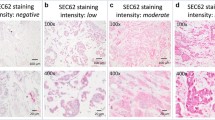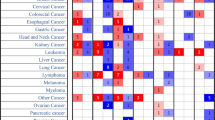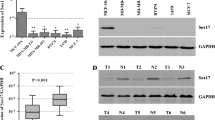Abstract
Purpose
Constitutive activation of JAK/STAT pathway is observed in various solid tumors and hematological malignancies. SOCS3 acts as a key negative regulator of JAK/STAT pathway and represents one of the candidate tumor suppressor genes. In the current study, we aimed to evaluate SOCS3 expression in breast carcinoma and to explore the prognostic significance of SOCS3.
Methods
The expression of SOCS3 was measured by Western blot and immunohistochemistry in breast carcinoma cells and a large cohort of tissue microarray, respectively.
Results
Among 367 human primary breast tumors, SOCS3 protein was detected in 103 patients. Deficient SOCS3 expression correlated significantly with lymph node metastasis (P = 0.003), blood vessel invasion (P = 0.029), VEGF (P = 0.001) and Ki-67 (P = 0.027). Univariate and multivariate analyses revealed that SOCS3 expression was an independent prognostic factor for disease-free survival (P < 0.0001). A positive SOCS3 protein expression correlated significantly with a low pSTAT3 protein expression in breast carcinoma (P = 0.015). The patients with a SOCS3 (+)/pSTAT3 (−) phenotype had a better prognosis than any other combination (DFI: P < 0.0001, BCSS: P = 0.013).
Conclusions
Deficient expression of SOCS3 is associated with an aggressive phenotype and portends a poor clinical outcome in breast carcinoma.






Similar content being viewed by others
Abbreviations
- ANT:
-
Adjacent non-cancerous tissues
- BCSS:
-
Breast carcinoma-specific survival
- CI:
-
Confidence interval
- DFI:
-
Disease-free interval
- ER:
-
Estrogen receptor
- IDC:
-
Infiltrating ductal carcinoma
- IHC:
-
Immunohistochemistry
- LN:
-
Lymph node
- PR:
-
Progesterone receptor
- RR:
-
Relative risk
- SOCS3:
-
Suppressor of cytokine signaling 3
- STAT3:
-
Signal transducers and activators of transcription 3
- TSG:
-
Tumor suppressor gene
- TMA:
-
Tissue microarray
- SDS:
-
Sodium dodecyl sulfate
- VEGF:
-
Vascular endothelial growth factor
References
Abdulghani J, Gu L, Dagvadorj A, Lutz J, Leiby B, Bonuccelli G, Lisanti MP, Zellweger T, Alanen K, Mirtti T, Visakorpi T, Bubendorf L, Nevalainen MT (2008) Stat3 promotes metastatic progression of prostate cancer. Am J Pathol 172(6):1717–1728. doi:10.2353/ajpath.2008.071054
Barclay JL, Anderson ST, Waters MJ, Curlewis JD (2009) SOCS3 as a tumor suppressor in breast cancer cells, and its regulation by PRL. Int J Cancer 124(8):1756–1766. doi:10.1002/ijc.24172
Bowman T, Broome MA, Sinibaldi D, Wharton W, Pledger WJ, Sedivy JM, Irby R, Yeatman T, Courtneidge SA, Jove R (2001) Stat3-mediated Myc expression is required for Src transformation and PDGF-induced mitogenesis. Proc Natl Acad Sci USA 98(13):7319–7324. doi:10.1073/pnas.131568898
Elliott J, Suessmuth Y, Scott LM, Nahlik K, McMullin MF, Constantinescu SN, Green AR, Johnston JA (2009) SOCS3 tyrosine phosphorylation as a potential bio-marker for myeloproliferative neoplasms associated with mutant JAK2 kinases. Haematologica 94(4):576–580. doi:10.3324/haematol.2008.002352
Francipane MG, Eterno V, Spina V, Bini M, Scerrino G, Buscemi G, Gulotta G, Todaro M, Dieli F, De Maria R, Stassi G (2009) Suppressor of cytokine signaling 3 sensitizes anaplastic thyroid cancer to standard chemotherapy. Cancer Res 69(15):6141–6148. doi:10.1158/0008-5472.CAN-09-0994
Fujimoto M, Naka T (2003) Regulation of cytokine signaling by SOCS family molecules. Trends Immunol 24(12):659–666. doi:10.1016/j.it.2003.10.008
Garcia R, Yu CL, Hudnall A, Catlett R, Nelson KL, Smithgall T, Fujita DJ, Ethier SP, Jove R (1997) Constitutive activation of Stat3 in fibroblasts transformed by diverse oncoproteins and in breast carcinoma cells. Cell Growth Differ 8(12):1267–1276
Garcia R, Bowman TL, Niu G, Yu H, Minton S, Muro-Cacho CA, Cox CE, Falcone R, Fairclough R, Parsons S, Laudano A, Gazit A, Levitzki A, Kraker A, Jove R (2001) Constitutive activation of Stat3 by the Src and JAK tyrosine kinases participates in growth regulation of human breast carcinoma cells. Oncogene 20(20):2499–2513. doi:10.1038/sj.onc.1204349
He B, You L, Uematsu K, Zang K, Xu Z, Lee AY, Costello JF, McCormick F, Jablons DM (2003) SOCS-3 is frequently silenced by hypermethylation and suppresses cell growth in human lung cancer. Proc Natl Acad Sci USA 100(24):14133–14138. doi:10.1073/pnas.2232790100
Hilton DJ (1999) Negative regulators of cytokine signal transduction. Cell Mol Life Sci 55(12):1568–1577. doi:10.1007/s000180050396
Hirano T, Ishihara K, Hibi M (2000) Roles of STAT3 in mediating the cell growth, differentiation and survival signals relayed through the IL-6 family of cytokine receptors. Oncogene 19(21):2548–2556. doi:10.1038/sj.onc.1203551
Isobe A, Takeda T, Sakata M, Yamamoto T, Minekawa R, Hayashi M, Auernhammer CJ, Tasaka K, Murata Y (2006) STAT3-mediated constitutive expression of SOCS3 in an undifferentiated rat trophoblast-like cell line. Placenta 27(8):912–918. doi:10.1016/j.placenta.2005.10.003
Isomoto H, Mott JL, Kobayashi S, Werneburg NW, Bronk SF, Haan S, Gores GJ (2007) Sustained IL-6/STAT-3 signaling in cholangiocarcinoma cells due to SOCS-3 epigenetic silencing. Gastroenterology 132(1):384–396. doi:10.1053/j.gastro.2006.10.037
Kim JH, Kim JE, Liu HY, Cao W, Chen J (2008) Regulation of interleukin-6-induced hepatic insulin resistance by mammalian target of rapamycin through the STAT3–SOCS3 pathway. J Biol Chem 283(2):708–715. doi:10.1074/jbc.M708568200
Kinjyo I, Ohishi M, Shouda T, Kobayashi T, Yoshimura A (2007) Positive and negative roles of IL-6, STAT3, and SOCS3 in inflammatory arthritis. Adv Exp Med Biol 602:113–124. doi:10.1007/978-0-387-72009-8
Krishnadasan R, Bifulco C, Kim J, Rodov S, Zieske AW, Vanasse GJ (2006) Overexpression of SOCS3 is associated with decreased survival in a cohort of patients with de novo follicular lymphoma. Br J Haematol 135(1):72–75. doi:10.1111/j.1365-2141.2006.06248.x
Li WC, Ye SL, Sun RX, Liu YK, Tang ZY, Kim Y, Karras JG, Zhang H (2006) Inhibition of growth and metastasis of human hepatocellular carcinoma by antisense oligonucleotide targeting signal transducer and activator of transcription 3. Clin Cancer Res 12(23):7140–7148. doi:10.1158/1078-0432.CCR-06-0484
Martini M, Pallini R, Luongo G, Cenci T, Lucantoni C, Larocca LM (2008) Prognostic relevance of SOCS3 hypermethylation in patients with glioblastoma multiforme. Int J Cancer 123(12):2955–2960. doi:10.1002/ijc.23805
Nakagawa R, Naka T, Tsutsui H, Fujimoto M, Kimura A, Abe T, Seki E, Sato S, Takeuchi O, Takeda K, Akira S, Yamanishi K, Kawase I, Nakanishi K, Kishimoto T (2002) SOCS-1 participates in negative regulation of LPS responses. Immunity 17(5):677–687. doi:10.1016/S1074-7613(02)00449-1
Nakagawa T, Iida S, Osanai T, Uetake H, Aruga T, Toriya Y, Takagi Y, Kawachi H, Sugihara K (2008) Decreased expression of SOCS-3 mRNA in breast cancer with lymph node metastasis. Oncol Rep 19(1):33–39
Niu G, Wright KL, Huang M, Song L, Haura E, Turkson J, Zhang S, Wang T, Sinibaldi D, Coppola D, Heller R, Ellis LM, Karras J, Bromberg J, Pardoll D, Jove R, Yu H (2002) Constitutive Stat3 activity up-regulates VEGF expression and tumor angiogenesis. Oncogene 21(13):2000–2008. doi:10.1038/sj/onc/1205260
Ogata H, Kobayashi T, Chinen T, Takaki H, Sanada T, Minoda Y, Koga K, Takaesu G, Maehara Y, Iida M, Yoshimura A (2006) Deletion of the SOCS3 gene in liver parenchymal cells promotes hepatitis-induced hepato-carcinogenesis. Gastroenterology 131(1):179–193. doi:10.1053/j.gastro.2006.04.025
Quan ML, McCready D (2009) The evolution of lymph node assessment in breast cancer. J Surg Oncol 99(4):194–198. doi:10.1002/jso.21201
Riehle KJ, Campbell JS, McMahan RS, Johnson MM, Beyer RP, Bammler TK, Fausto N (2008) Regulation of liver regeneration and hepatocarcinogenesis by suppressor of cytokine signaling 3. J Exp Med 205(1):91–103. doi:10.1084/jem.20070820
Roberts AW, Robb L, Rakar S, Hartley L, Cluse L, Nicola NA, Metcalf D, Hilton DJ, Alexander WS (2001) Placental defects and embryonic lethality in mice lacking suppressor of cytokine signaling 3. Proc Natl Acad Sci USA 98(16):9324–9329. doi:10.1073/pnas.161271798
Sheen-Chen SM, Huang CC, Tang RP, Chou FF, Eng HL (2008) Prognostic value of signal transducers and activators of transcription 3 in breast cancer. Cancer Epidemiol Biomark Prev 17(9):2286–2290. doi:10.1158/1055-9965.EPI-08-0089
Takahashi Y, Carpino N, Cross JC, Torres M, Parganas E, Ihle JN (2003) SOCS3: an essential regulator of LIF receptor signaling in trophoblast giant cell differentiation. EMBO J 22(3):372–384. doi:10.1093/emboj/cdg057
Takahashi Y, Takahashi M, Carpino N, Jou ST, Chao JR, Tanaka S, Shigeyoshi Y, Parganas E, Ihle JN (2008) Leukemia inhibitory factor regulates trophoblast giant cell differentiation via Janus kinase 1–signal transducer and activator of transcription 3–suppressor of cytokine signaling 3 pathway. Mol Endocrinol 22(7):1673–1681. doi:10.1210/me.2008-0058
Tokita T, Maesawa C, Kimura T, Kotani K, Takahashi K, Akasaka T, Masuda T (2007) Methylation status of the SOCS3 gene in human malignant melanomas. Int J Oncol 30(3):689–694
Weber A, Hengge UR, Bardenheuer W, Tischoff I, Sommerer F, Markwarth A, Dietz A, Wittekind C, Tannapfel A (2005) SOCS-3 is frequently methylated in head and neck squamous cell carcinoma and its precursor lesions and causes growth inhibition. Oncogene 24(44):6699–6708. doi:10.1038/sj.onc.1208818
Weerasinghe P, Garcia GE, Zhu Q, Yuan P, Feng L, Mao L, Jing N (2007) Inhibition of Stat3 activation and tumor growth suppression of non-small cell lung cancer by G-quartet oligonucleotides. Int J Oncol 31(1):129–136
Yang SF, Yeh YT, Wang SN, Hung SC, Chen WT, Huang CH, Chai CY (2008) SOCS-3 is associated with vascular invasion and overall survival in hepatocellular carcinoma. Pathology 40(6):558–563. doi:10.1080/00313020802320432
Yu H, Jove R (2004) The STATs of cancer-new molecular target come of age. Nat Rev Cancer 4(2):97–105. doi:10.1038/nrc1275
Conflict of interest statement
The author(s) indicated no potential conflicts of interest.
Author information
Authors and Affiliations
Corresponding author
Rights and permissions
About this article
Cite this article
Ying, M., Li, D., Yang, L. et al. Loss of SOCS3 expression is associated with an increased risk of recurrent disease in breast carcinoma. J Cancer Res Clin Oncol 136, 1617–1626 (2010). https://doi.org/10.1007/s00432-010-0819-6
Received:
Accepted:
Published:
Issue Date:
DOI: https://doi.org/10.1007/s00432-010-0819-6




